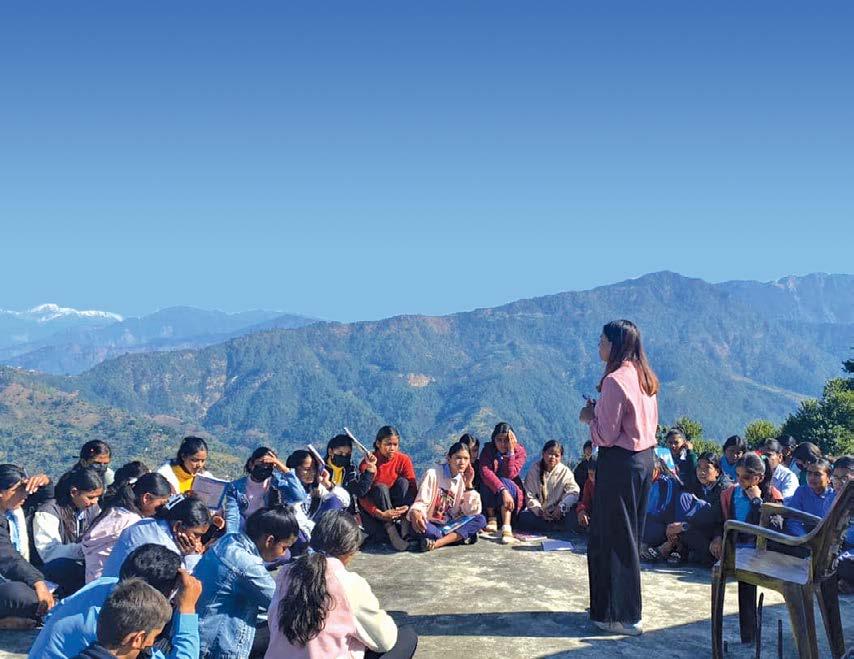

YOUTH SOUNDING BOARD
IN NEPAL
Foreword


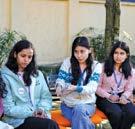

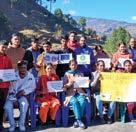
About the YSB About the YSB
The Youth Sounding Board (YSB) is a platform designed to integrate the voices of young Nepali women and men into the European Union's efforts in Nepal. This consultative platform aims to ensure that the European Union's actions in Nepal are more participatory, relevant, and effective by involving young people more directly in decision-making processes. By creating a space for youth to engage in dialogue with European Union institutions and its Member States, the Government of Nepal and other national actors, the YSB seeks to bridge the gap between policymakers and the younger generation.
In the YSB, young women and men are active participants in ensuring projects are designed, implemented, and monitored with a deeper understanding of the challenges and aspirations of Nepal's youth. Ultimately, the YSB fosters a more participatory, relevant, and impactful approach to the European Union's activities, benefiting both Nepal and the European Union.

Foreword Foreword
I am pleased to share with you the End of Year Report of the second cohort of the Youth Sounding Board, prepared by a dynamic and inspiring group of young women and men who have actively participated in the second edition of this meaningful initiative.
The Youth Sounding Board (YSB) was established in 2022, the European Union’s Year of Youth. With its creation, the European Union intended to open a consultative space for Nepali youth to influence the European Union’s activities in Nepal. The YSB also bridges a gap in those spaces where youth voices are underrepresented and promotes their participation in consultations and public dialogue and debate.
This report is more than just a compilation of recommendations,
feedback and learnings. It is an evidence of the passion, creativity and dedication of young minds who are deeply engaged in issues that shape our collective future, such as environment and climate change, good governance, gender equality, education and employment, diversity and inclusion. Their views and perspectives display a fresh and innovative approach. We admire their commitment to this initiative and the contributions and thoughtful analysis they have provided through their experience in 2024, the year that celebrates the 50th Anniversary of NepalEuropean Union friendship.
I would like to thank everyone who contributed to this important work. Your efforts are paving the way for a brighter, more inclusive future.
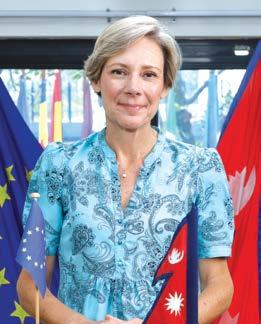
Her Excellency
Veronique Lorenzo, European Union Ambassador to Nepal
Introduction Introduction


Being a part of YSB has been a game-changer for my entrepreneurial journey. Having my own stall at the Business Forum was an incredible opportunity that gave me the exposure I needed. The experience has armed me with essential knowledge, a strong network, and necessary support vital for my personal and professional growth. Roshan
The Youth Sounding Board (YSB) is an advisory committee for Nepali youth to have an influence and say into the European Union's efforts in Nepal. By creating a platform for youth engagement, the YSB ensures that the perspectives and needs of young individuals are at the forefront of policymaking and development initiatives.
The YSB in Nepal started in 2022, which was also the European Union's Year of Youth. The second YSB cohort was chosen the following year in 2023 and its tenure continued into 2024, which marked 50 years of relations between the European Union and Nepal. The second cohort of Youth Sounding Board (YSB) members included youth from the provinces of Karnali, Sudurpashchim, and Madhesh. These regions continue to face significant challenges due to their geographical location, socio-economic conditions, and historical marginalisation.
The second cohort initially comprised a diverse group of 26, now 21, youths from various backgrounds, including law, IT, social sciences, health and medicine, engineering, and more.
We are proud to say that our group was quite inclusive, with representation from the LGBTIQ+ community, people living with disabilities, and rural youth. This diversity made our group unique and enriched our collective perspective. Now, as we move forward, we're excited to welcome young people from all seven provinces of Nepal into the third cohort of the YSB. This expansion means that the YSB family is growing and including diverse voices from every part of the country.
The YSB wasn't alone in this journey. We had a great team of consortium partners helping us out. YSB members are divided into three main groups: Youth in Gender Equality and Social Inclusion (GESI), led by Oxfam in Nepal and Yuwalaya; Youth in Governance, led by Helvetas Nepal; and Youth in Climate Action, led by Youth Innovation Lab and Restless Development Nepal. Thanks to these partnerships, we've been able to join various monitoring visits, review sessions, consultations, project closures, and launch events that have expanded our knowledge and basic skills. These opportunities have also allowed us to share our ideas and concerns directly with the organisations involved.
We have participated in design, monitoring, engagements in regular consultations, workshops, and meetings with European Union representatives, including three high-level visits from Brussels. Interacting and speaking to all these different groups of people has helped the YSB do its job better by learning from their expertise. The YSB is a great way for young people to get involved in what the European Union does in Nepal. We help plan projects,
make sure they work, and tell them what we think. This way, young people have a say in decisions that affect them, and Nepal can be a better place for everyone.
We would like to thank the Delegation of the European Union to Nepal for listening to us and making us feel important.
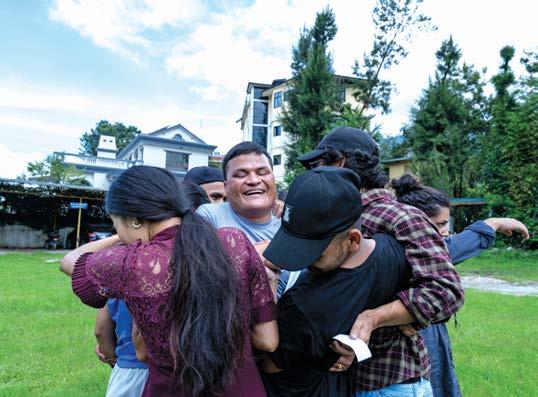


YSB taught me to be more vocal and confident. I had the chance to visit new places in Madhesh and Karnali provinces where I got to interact with different communities and received insight on the gap between the grassroots and the decision-making level.
Executive Summary Executive Summary
Recap of the year’s activities and achievements
Recap of the year’s activities and achievements
Nepal grapples with a complex interplay of societal discrimination, climate vulnerability, and political nepotism. As future leaders, we directly experience these impacts. Our perspectives are essential in finding solutions.
This report compiles recommendations, feedback, and learnings from the second cohort of the YSB. It focuses on the Delegation of the European Union to Nepal's efforts to make its work more youth-relevant, reflecting the needs and capacities of young people.
Youth participation in Nepal has traditionally been minimal, often dismissed as an inexperienced and naïve demographic. In Nepal, youth are defined as those aged 16 to 40 and constitute a significant portion of the population. Despite this, their needs and priorities are often overlooked in policies and projects. Platforms like the YSB have inspired us to voice our concerns and impact our communities' development. As YSB members, we have been engaged, connected, and empowered by joining the activities and programmes of the European Union and its partner organisations as youth representatives. This has not only given us a chance to voice our opinions but also to learn about various important issues as many of us are students and early-career professionals.
This report presents learnings from our year-long tenure as YSB members and provides recommendations to make the European Union's work more youth-friendly. These recommendations are based on our personal experiences, visits to local communities in Karnali, Sudurpashchim, and Madhesh provinces, and our participation in European Union -funded projects.
The report begins with overall policy recommendations and then moves to programmatic suggestions, focusing mainly on local initiatives and what needs to be done on the ground. It also covers specific engagements of the YSB under three key areas: Youth in GESI (Gender Equality and Social Inclusion), Youth in Governance, and Youth in Climate Action.
Nepal grapples with a complex interplay of societal discrimination, climate vulnerability, and political nepotism, Youth are at the forefront of these challenges. As future leaders, we directly experience the impacts of societal norms,
climate change, and political issues. Our perspectives are essential in finding solutions.
In summary, here are our recommendation to the Delegation of the European Union in Nepal and its development partners:
The time to invest in youths is now. Nepal's young population represents a vast, untapped potential that could drive the nation's future growth and development. To unlock this potential, there is an urgent need for streamlined plans, timely subsidies to encourage youth participation, and efficient processes to engage them effectively. Stronger engagement strategies are essential to harnessing the full capabilities of Nepal's youth.
In today's digital age, digital literacy is paramount. To maximise the benefits of youth investment, a focus on providing digital literacy training, particularly for rural youths, is a must. This training will ensure that all young people have the skills to use digital tools effectively, bridging the gap between urban and rural areas and fostering equal opportunities for all.
Youth in GESI: Creating safe spaces for dialogue and
collaboration on GESI issues is essential. To begin, thorough assessments can be conducted to understand the diverse needs and challenges faced by these groups. Projects can then be tailored to address these intersecting factors, involving local stakeholders and ensuring cultural sensitivity to effectively meet the needs of marginalised youths.
Youth in Governance: To strengthen youth involvement in governance, we recommend that the EU support the implementation of Model Provincial Assemblies in schools across Nepal. These mock assemblies would allow students to simulate legislative processes and receive mentorship from experienced politicians. This hands-on experience will provide practical insights into governance and encourage active civic participation among young people.
Youth in Climate Action: By investing in youth-led data initiatives and providing the necessary training and resources, we can empower young people to become climate change champions with the skills to analyse and utilise climate data. Data-driven solutions will be instrumental in mitigating the impacts of climate change and building a sustainable future.
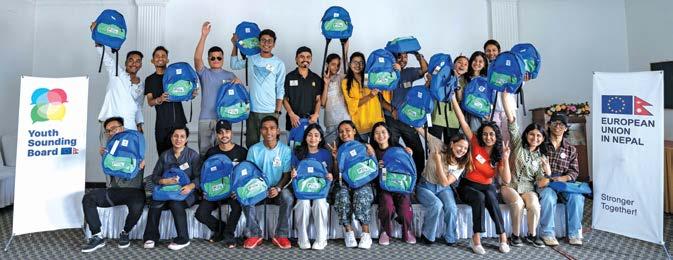
Highlights of the Year Highlights of the Year
30 August
Meeting with Swedish Parliamentarians
YSB members from the first and second cohorts had a meeting with four Swedish Parliamentarians on youth-focused policies in Sweden and the European Union, and their lessons for Nepal.
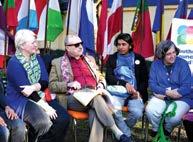
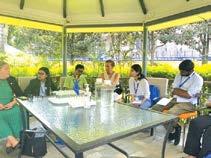
5 March
Meeting with Mr. Mario Ronconi, Head of Unit, South & Southeast Asia, Directorate General for International Partnership (DG INTPA), European Union
We had a productive exchange of ideas around education and the Global Gateway programme with Mr Ronconi.
5 March
Launch of mentorship
An exciting opportunity for us YSB members to learn from Erasmus alumni in various fields in Nepal through a Youth-toYouth (Y2Y) mentorship. We received hands-on mentorship and guidance from our mentors for our education and career plans.
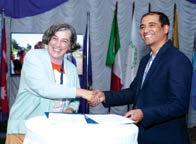
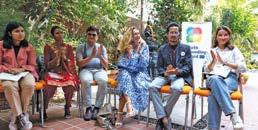
15-16 May/20 May
Business Forum/Civil Society Organisations (CSO) Forum
We volunteered at the European Union-Nepal Business Forum where Roshan Ojha, a YSB Member, had his own stall. At the CSO forum, we shared our experiences and reaffirmed our commitment to collaborating with on development projects.
9-10 October
YSB Nepal representation at the Global Gateway High Level Event in Brussels
Rachana Panthi, a YSB member, proudly represented Nepal in Brussels. She was excited to craft recommendations, along with other young leaders from around the world, on global youth empowerment.
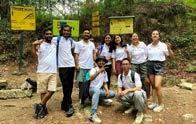
14 May
Meeting with Deputy Director
General Myriam Ferran
We had the opportunity to discuss critical issues around Eeergy and entrepreneurship in Nepal. We also shared our experiences starting businesses, highlighting both the exciting opportunities and the challenges we’ve faced.
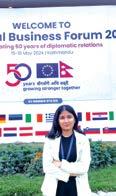
15 June
YSB hike
Under the theme “Hiking with Purpose”, marking June as environment month, we organised a hike while collecting trash along the way. This helped us build a stronger bond of togetherness.

Recommendations Recommendations
Policy Recommendations
Policy Recommendations
The report begins with overall policy recommendations and then moves to programmatic suggestions, focusing mainly on local initiatives and what needs to be done on the ground.


The tenure of the Youth Sounding Board was very beneficial and productive for me. I had the opportunity to learn a lot. This program encouraged me to build selfconfidence and self-reliance with new energy.
Jyoti
Reflect youth voices in policy
Youth engagement in Nepal is at a pivotal moment. Over 771,000 Nepali youths leaving the country for better opportunities abroad in the fiscal year 2022/23 alone is very alarming.1 To tackle the issues that young people face, we need a well-rounded approach that takes into account our needs and desires. With diverse challenges across regions, from the mountainous Karnali to the plains of Madhesh, there's a pressing need for youth-centric solutions. This means focusing on policies and actions that help us find jobs, start businesses, and improve our education and skills. We also need support to make sure young people have a say in decisions that affect us.
Invest in Nepal's youth
This is the time to invest in youth. Our fundamental need is quality education and quality employment for a secure and fulfilling life. To help, more jobs should be created and young
leaders supported with grants and training. We want to see more collaboration between Nepali and European educational institutions to enhance research and innovation, and also facilitate student exchange programmes, which will help modernise curricula and provide life experiences that can help us become more worldly individuals.
Our education system needs updating to match what the job market needs. By aligning education with what employers are looking for, we can ensure young people get the skills they need to succeed and have a brighter future. By focusing on vocational training, STEM education, and entrepreneurship in sectors with high growth potential such as agriculture, tourism, and renewable energy, the European Union can help young Nepalis acquire the skills needed for the job market.
1. https://myrepublica.nagariknetwork.com/news/over-771-000-youths-sought-foreign-employment-in-fy-2022-23/
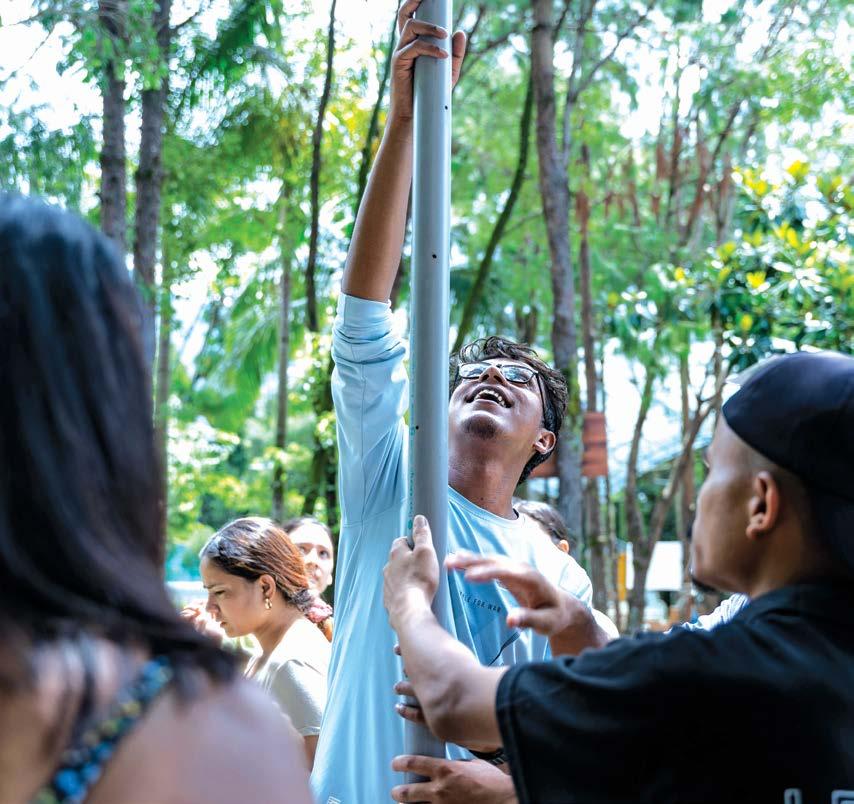
Breaking barriers to include youth
To make our society truly inclusive and fair, we need better policies and programmes that support everyone, especially those facing extra challenges. Right now, we often see the same people representing different groups, which doesn’t ensure that everyone’s voice is heard. In many meetings, we hear from stakeholders but not from the actual people affected, and women and youth are sometimes only included as a token gesture. We know the European Union in Nepal is trying to include women and youth more, but breaking old habits is tough.
We want to see even more real opportunities for everyone to be heard and involved in decision-making. To ensure that young people play a meaningful role in decision-making, the European Union can establish and support formal channels for youth participation. This can include setting up youth advisory councils at local, provincial, and national levels and ensuring that youth representatives are included in key decision-making bodies. A formal mechanism for youth involvement in policy creation, such as dedicated youth forums or committees, and actively encouraging their participation in policy dialogues can be established. Additionally, there should be a focus on bridging the gap between high-level policy discussions and the real challenges faced by young people. Policies should be updated to better reflect the current needs of youth, with improved support for internships, job training programmes, and access to relevant information.
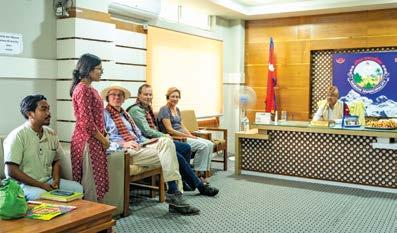
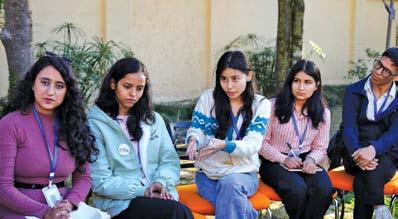
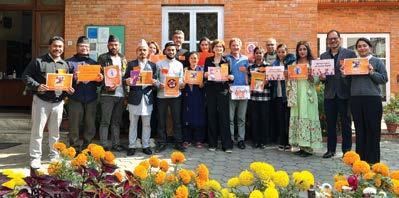
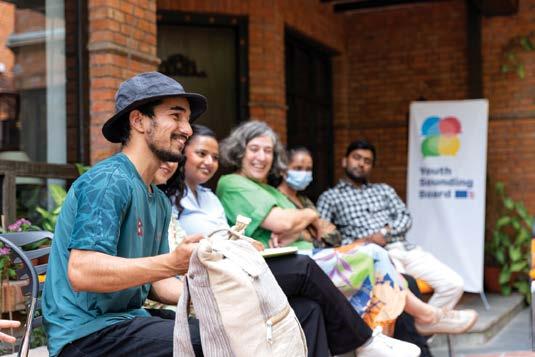
LEARNING FROM EXPERIENCE
Roshan, an entrepreneur and YSB member, shared his experience with his startup, Kanduk Industry, which produces bags and other material out of banana fibre.
“Throughout our journey, we faced significant challenges, particularly in the infrastructure required for our endeavours. We have yet to conduct comprehensive research to produce high-quality banana fibre and fabric, and the lack of automation hampers our progress. Our traditional methods are not automated, resulting in low production and limits our ability to achieve the desired quality of our
products. We face issues such as inefficient bureaucratic processes, a lack of timely subsidies for youth entrepreneurs, and weak engagement strategies from the government.”
Roshan’s statements underscore the need for streamlined plans that take into account the needs of youth entrepreneurs. Here, the European Union can play a crucial role by providing the three tiers of government with financial support and technical expertise to improve infrastructure while also providing entrepreneurs with training to overcome financial barriers and upscale their ventures.


The Youth Sounding Board has had a positive impact on my personality development and leadership skills. I am now working on various projects as a result of the strong network I developed as well as the meaning of learning experience.
Man Singh
Recommendations Recommendations
Programmatic Recommendations
Programmatic Recommendations
As YSB members, we've attended many European Union and its partner events. We loved interacting and learning at the same time. We deeply appreciate the invitation and enabling environment that allows us to speak our minds freely. Throughout, we have had the chance to review projects and hold consultations to share our views, which were heavily Kathmandu centric. Keeping this in mind we have following suggestions.
From aid to independence
To make a real difference, the European Union can help design projects that truly meet local needs and make sure young people are involved in every stage. There needs to be a focus on creating content and resources in local languages so that everyone is able to learn about the programmes that affect them. We should include everyone, especially those who are often left out, and ensure projects can keep going even after the funding ends. For funding, we need simpler ways to apply and report. Creating jobs that are sustainable is imperative so projects should be designed to ensure locals will have financial security even after the project ends.
Promote digitisation
As the European Union's Global Gateway initiative also focuses on the digital sector, it would be prudent to integrate digital connectivity as a key component in all of the European
Union's projects in Nepal. We can thus reduce costs and close the connectivity gap, especially in remote areas. With better internet access, people in remote communities can get online education, healthcare, and financial services, improving their lives and opening new economic opportunities. Investing in digital infrastructure encourages local innovation and creates jobs. To make the most of this, the European Union needs to provide digital literacy training to ensure everyone can use these tools effectively, especially rural youths.
RETHINK APPROACHES
During a monitoring visit to Karnali for a GRAPE project implemented by GIZ, we learned about combining scientific and traditional methods for mulching and manure, which are important for local farming, by providing buffaloes to locals. However, an unintended consequence of the incentive programme promoting buffalo ownership became evident. While intended to boost income, it inadvertently increased the burden on children, particularly girls, due to grazing responsibilities, impacting their education. This was worrying and showed that we need to rethink our plans to truly help the community without causing new problems. As young people, we should push to check the full impact of projects and the European Union itself
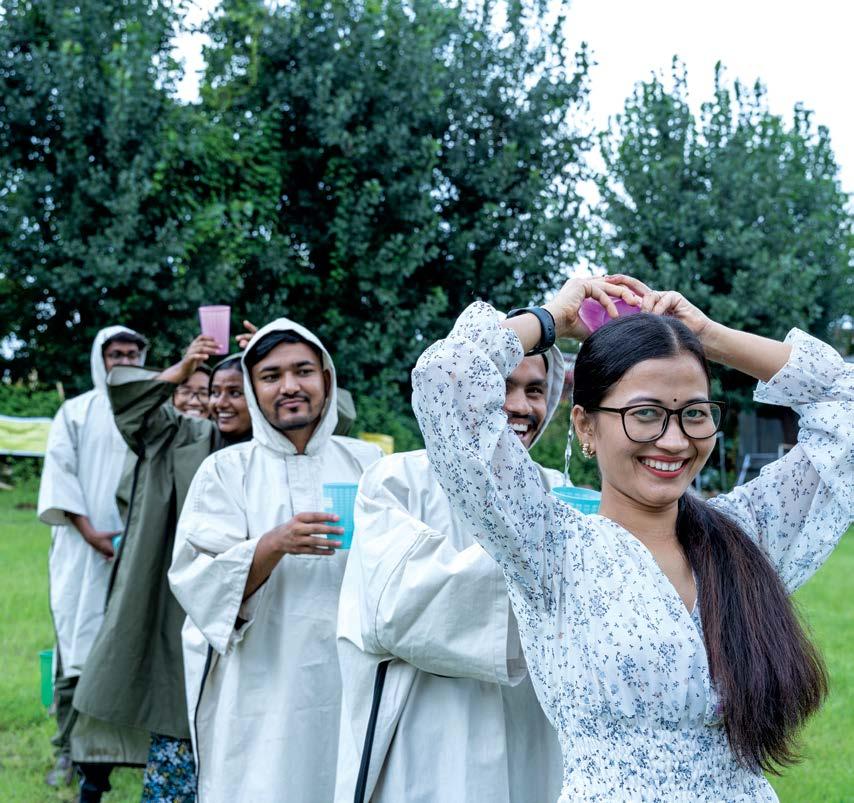
Youth in GESI Youth in GESI
Nepal has made significant strides in advancing gender equality and social inclusion (GESI) through constitutional provisions and policy frameworks. The country has established legal protections for women, marginalised groups, and LGBTIQ+ individuals.


The Youth Sounding Board made me a real leadership capable youth. It made me more disciplined and responsible, taught me how to socialize, and made me want to be a leader.
Kaiyum
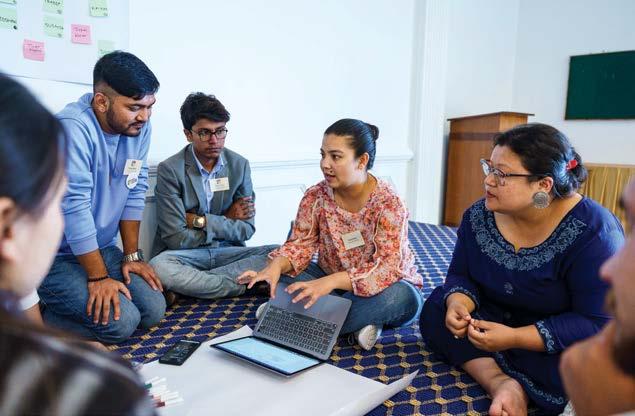
Unity in diversity
GESI is a complex issue that affects us all in different ways. As YSB members, we come from a wide range of backgrounds, including rural and urban areas, different economic statuses, youths living with disabilities and diverse identities. This diversity enriches our understanding of GESI and allows us to approach the issue from multiple perspectives. This diversity within our group is our greatest strength, as it enables us to create inclusive and effective solutions.
Nepal has made significant strides in advancing GESI through constitutional provisions and policy frameworks. The country has established legal protections for women, marginalised groups, and LGBTQ+ individuals. We have seen some progress from the Local Governance and Community Development Programme (LGCDP), which implemented GESI-responsive planning and budgeting in all 753 local governments, allocating at least 10% of budgets for GESI activities.2
Despite these provisions, deep-rooted patriarchal norms, limited access to resources and opportunities for women and marginalised groups, and weak enforcement of existing laws hinder progress. The gap between policy and practice remains wide.
Overcoming these challenges requires concerted efforts from government, civil society, and individuals to create a more equitable and inclusive society.
Recommendations
From the Margins to the Mainstream
It's disappointing to see how often men don't participate meaningfully in GESI (Gender Equality and Social Inclusion) issues. We need to ensure that everyone is involved in GESI-related programmes, and no one is left out. During discussions, we noticed a focus on including various minorities and genders, which is great. But to truly drive any project or programme forward, we need the participation of the backbone: the youth, like us.
Youth-oriented programmes must be included because we are the bridge between the government and the people. While setting up the YSB and involving us is a great initiative already, we need more meaningful engagement for political balance and progress.
“It was surprising to see so many intellectuals in the room, but hardly any youth. When it comes to gender inclusion, the focus seemed to be mostly on women. As someone from the queer community, I believe it's time for rainbow inclusion too. We, the queer community, are ready to act and contribute. We matter to the
2. https://www.adb.org/publications/nepal-gender-equality-social-inclusion-diagnostic


I always wanted to give back to my community. YSB helped me understand the grassroots challenges and the importance of including diverse views in social interventions. I am grateful for this transition from an enthusiastic teen to a socially responsible and empowered young adult.
Aayushma
PROJECT HIGHLIGHT
A Monitoring field visit on “Youth-led GESI initiatives” on the occasion of 16 Days of Activism against genderbased violence (GBV) was held in Dailekh by Yuwalaya, the implementing partner of Oxfam in Nepal, in Dungeshwor Rural Municipality. As part of the 16 Days of Activism, the focus was on assessing youthled GESI initiatives, particularly those addressing GBV and Sexual Reproductive Health and Rights (SRHR). Spending time in Dailekh and engaging with the community, ward members, and young girls was an eye-opening experience. Seeing firsthand how young people, especially girls, are navigating issues like GBV and SRHR was powerful. We conducted a twohour session on SRHR at Jwala Secondary School in Bhagwatimai Rural Municipality and the topics covered included GBV, consent and law, abortion, sex and sexuality, and contraception.
The strength and resilience of women like Hira Kumari was inspiring. Her story showed how education and support can empower individuals to overcome challenges. Through community REFLECT classes, Hira Kumari learned about her rights, understood what domestic violence was, and gained the courage to stand up for herself. She went to court to demand her property rights and learned new skills like making bags, which provided her with a source of income and self-worth. Hira Kumari's story exemplified how education can empower individuals to overcome challenges and help them fight for their rights. By supporting initiatives like REFLECT, we can help more women achieve their potential and contribute positively to their communities.
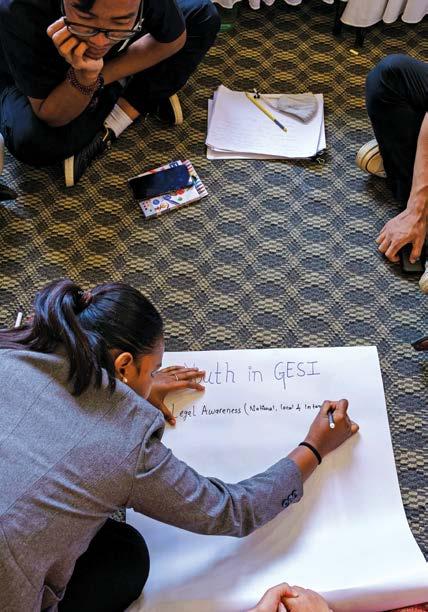
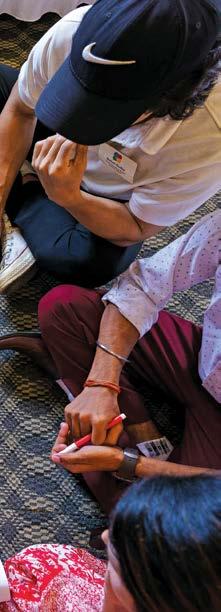
world just as much.” YSB member Pradip shared when reflecting on a Validation Workshop Appraisal Mission Local Adaptation to Climate Change (LACC) event.
Tailor Made for Change
Working on GESI projects in Nepal is tough because of the unique socio-economic dynamics of each community. Factors such as caste, ethnicity, religion, disability, geographic location, and socioeconomic status intersect in complex ways, shaping experiences and opportunities. That’s why it's very important to assess each community before starting any project and tailor it specifically to their needs. Every GESI project should be designed to be flexible, recognising that what works in one place might not work in another.
It's crucial to address the needs of marginalised groups like ethnic minorities, LGBTIQ+ individuals, and people with disabilities. Creating safe spaces for dialogue and collaboration on GESI issues is also a must. Begin by conducting thorough assessments to understand the diverse needs and challenges faced by different groups. Tailor each project to address these intersecting factors by engaging local stakeholders and ensuring cultural sensitivity. This way, everyone gets a chance to be heard and to contribute to making our society more inclusive and equitable.
Incentives for Local Actors
To make sure our projects last, it’s crucial that the community takes ownership. One way to do this is by boosting support for local advocates like Female Community Health Volunteers (FCHVs), Local Resource Persons (LRPs), and other activists who play a key role in these projects. We should improve their compensation to show that their hard work is valued and to keep them motivated. This could be done by increasing their pay, offering bonuses, long-term employment or providing other forms of support like training and resources-laptop, portable WiFi. When these local heroes are better supported and make them more skilled, they’ll be more likely to stay involved and help ensure that projects continue to make a positive impact.
From Skill to Sale
While the development of skills like crocheting is a significant step towards women's economic empowerment, it is essential to address the subsequent challenge of market access. The ability to convert these newly acquired skills into sustainable livelihoods requires a concrete support system. To bridge this gap, followup initiatives should focus on market linkages, business development training, and access to finance. By providing women with the necessary tools and resources to sell their products, we can ensure that their skills translate into tangible economic benefits.
Youth in Governance Youth in Governance
Youth-led advocacy groups have successfully campaigned for the inclusion of youth representatives in local decision-making bodies. As a result, there has been a 25% increase in youth representation in municipal councils across the country.
Young Leaders Take Charge in Nepal
Nepal has witnessed a surge in youth participation in politics in recent years, with influential youths like Kathmandu Mayor Balen Shah and Deputy Mayor Sunita
Dangol indicating the rising engagement of young people in local governance.3 Youth-led advocacy groups have successfully campaigned for the inclusion of youth representatives in local decision-making bodies. As a result, there has been a 25% increase in youth representation in municipal councils across the country.4
Deep-rooted political nepotism and corruption, however, continue to undermine the youth’s efforts and make it difficult to navigate established political networks. Youth-led initiatives often struggle with insufficient resources and support, while resistance from established politicians can limit their influence. Youths require support to become leaders.
Recommendations
A New Era of Youth Engagement
Political instability and a history of rapid changes in leadership have led to frustration and disengagement among youth. With 16 prime ministers over the past six years, many young people feel disillusioned with the political system. Youth are often tokenised in political campaigns rather than being meaningfully involved in decision-making processes.
To address this, we recommend enhancing political literacy through educational programmes and youth workshops that clarify the roles and responsibilities of different government bodies. We recommend that the European Union supports the implementation of Model Provincial Assemblies in schools across Nepal. These assemblies would allow students to simulate legislative processes and receive mentorship from experienced politicians, offering them practical insights into governance. This
3. https://nepaleconomicforum.org/prospects-of-youth-participation-in-political-landscape-in-nepal/ 4. https://www.researchgate.net/publication/373523946_Investigating_Youth_Involvement_in_Local_Governance
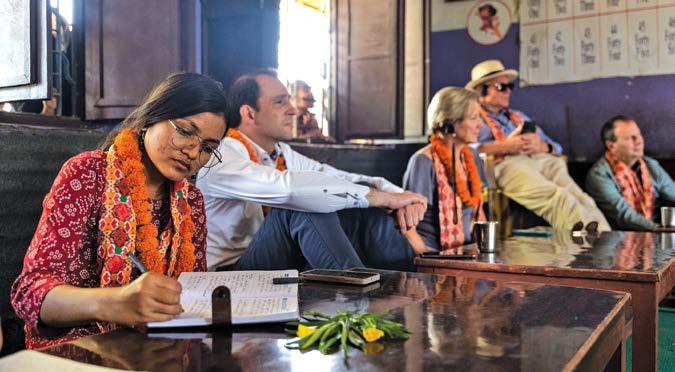
initiative would not only enhance students' understanding of the legislative process but also inspire future leaders and promote civic engagement from a young age. Policies mandating youth representation in decision-making bodies, along with leadership programmes, can ensure young voices are included in policymaking. Promoting positive role models and facilitating dialogues between youth and politicians can combat negative mindsets and inspire more youth to engage in politics.
Digital Democracy
To enhance transparency and boost youth participation, we need specific digital platforms like government transparency portals and online consultation tools. These platforms should provide real-time updates on government activities, allow
us to give feedback on policies, and include features like forums and live chats. Civic engagement apps can help us stay informed and involved in local issues, while election tools can support voter education and youth-led campaigns. The European Union should work with tech companies and local experts to build and maintain these platforms, ensuring they are user-friendly, secure, and regularly updated. This approach will help us stay connected, informed, and actively engaged in political processes.
From Classroom to Cabinet
To enhance youth involvement in governance, we should implement leadership training programmes focused on governance and public policy. Programmes like these can
provide young people with the necessary skills to contribute effectively to policy development and governance processes. We can look at successful examples such as Sumana Shrestha’s internship programme, where participants contribute to parliamentary bills and ask for input, especially those from law schools who seek amendments.
YSB member Rakshya, who is a law student, said, “In college, we drafted a bill on AI in the context of Nepal and submitted the draft to the ministry for further input.” Such exercises can help youth engage with policy making and learn the processes that go in drafting bills, creating laws, and implementing them. The European Union can also help create internship opportunities in secretariates for policy development. Engaging youth in the parliamentarian policy development process can provide them with hands-on experience and a better understanding of the legislative process.
Building Stronger Panels
To enhance the effectiveness of projects like PROYEL and address the challenges observed, it is important to implement targeted strategies. In Madhesh province, where female participation in youth panels declines after marriage, initiatives should focus on creating supportive environments and flexible participation options for women. In Karnali, where political ideology conflicts with youth involvement, efforts should be made to promote inclusivity and respect for diverse political views within the panels. Providing targeted training and support can help navigate these issues, ensuring that youth panels remain vibrant, representative, and effective in their role in local governance.
PROJECT HIGHLIGHT
The PROYEL (Promotion of Youth Engagement in Local Governance Process) project is led by Helvetas Nepal and focuses on forming youth panels in each working municipality, providing education and opportunities for constructive engagement in local governance. During the mid-term review, we were introduced to the project’s detailed processes and the roles individuals can play in governance. We learned about the impact on the local level, including how youth participate and influence governance.
The review revealed that youth panels established in Karnali and Madhesh provinces were similar to the Youth Sounding Board (YSB) but operated solely at the local level. A positive outcome of the project was that local political representatives now engaged with these panels, regardless of political affiliations, and recognised their accountability. However, challenges remained in Madhesh with female participation in youth panels declining after marriage. In Karnali, political ideology conflicts affected youth involvement, with expectations to align with family or party affiliations.
Measuring Impact Beyond Numbers
Let's not just focus on numbers, but also share the stories of young people who are making a difference. Capturing qualitative impact through storytelling, multimedia content, and personal testimonials can provide a richer perspective on success of certain projects and the involvement of youth. By documenting the stories of empowered youth, strengthened communities, and enhanced transparency mechanisms, we can paint a more vivid picture of European Union-supported projects and their positive influence on local governance.
Youth in Climate Action Youth in Climate Action
Using data and technology to visualise the impacts of climate change can be a powerful tool for driving action. Initiatives like the Tag Me App showcase the potential of youth to collect crucial ground-level data.
Our Future, Our Fight
Nepal is ranked as the fourth most climate changevulnerable country in the world, despite contributing minimally to global greenhouse gas emissions.5 In response to this, Nepal has implemented initiatives such as the National Adaptation Plan, Green Schools Programme, and climate-resilient agricultural practices. One study indicates that youth start migrating as early as the age of 12 due to climate impacts.6 Despite these challenges, Nepal's youth are demonstrating remarkable resilience and leadership. From advocating for climate action to participating in reforestation efforts, young people are at the forefront of finding solutions. However, they need greater support, including access to education, resources, and opportunities to participate in decision-making processes.
Recommendations
Data for Climate Change
Using data and technology to visualise the impacts of climate change can be a powerful tool for driving action.
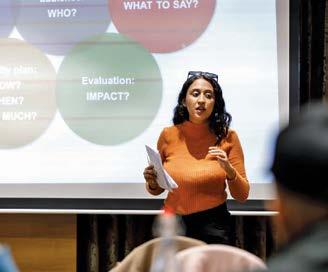
Initiatives like the Tag Me App showcase the potential of youth to collect crucial ground-level data. To maximise this potential, we need a robust ecosystem that supports data collection, analysis, visualisation, and utilisation. We
5. https://nepaleconomicforum.org/prospects-of-youth-participation-in-political-landscape-in-nepal/ 6. https://www.researchgate.net/publication/373523946_Investigating_Youth_Involvement_in_Local_Governance
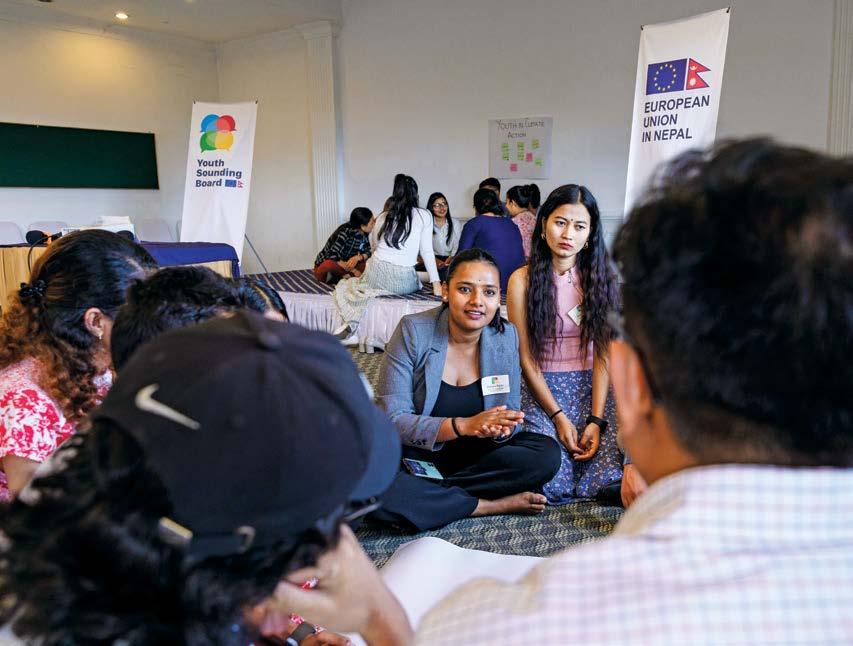
want the European Union to have provide access to more youth-centric data programmes, training, resources, and mentorship. By equipping young people with the necessary skills and tools, we can create a generation of data-driven climate change advocates. This will empower us to turn data into actionable solutions and drive meaningful change.
Uniting for a Greener Tomorrow
Leveraging digital platforms is crucial for reaching a wider audience and mobilising support. The European Union can help launch vibrant social media campaigns that highlight the urgency of climate action and showcase successful youth-led projects. Interactive content like infographics, videos, and virtual events can spread awareness and foster a sense of community among young climate activists.
PROJECT HIGHLIGHT
The Green Shift Project, led by CREASION, is a four-year initiative to tackle plastic waste in Nepal, focusing on Bagmati, Lumbini, and Madhesh provinces. The goal is to create a plastic-free Nepal through skill-building, policymaking, and community involvement. At the launch event in Chitwan, schools and entrepreneurs showcased their work and products made from plastic-free materials. The event also included a visit to Chitwan National Park, emphasising the importance of protecting Nepal’s natural environment. At the event, entrepreneurs were invited to showcase products made from plastic-free materials. We really liked unique products like glass frames, which were colourful and playful.
Climate change is a global crisis that demands global solutions. To effectively combat this challenge, we must harness the power of youth collaboration. Creating a network of young climate activists across borders is essential for sharing knowledge, inspiring action, and amplifying our collective voice. We urge the European Union to facilitate youth exchanges and partnerships between Nepali and European climate activists.
Wider Reach
First, let’s think about how we invite and reach out to young people. Instead of sticking to our usual circles, we should actively invite youths from beyond our immediate networks. By doing so, we can attract a diverse group of passionate individuals who might not otherwise have the chance to participate. This outreach should target rural youths, who often face significant barriers to access. We can use local channels like radio and newspapers. Marketing strategies need to be more inclusive, ensuring that we reach every corner and bring in those who might be otherwise left out.
Bring Authorities on Board
Since Bagmati Province Minister for Forest and Environment
Masina Khadka attended the launch of the CREASION project, we should use this opportunity to emphasise the government's responsibility to back young entrepreneurs and sustainable initiatives. There’s a crucial need for more support from the government, especially for those interested in sustainable entrepreneurship. Currently, young entrepreneurs struggle with complex processes and high taxation. We ask the European Union to advise the government to simplify procedures and reduce taxes on young entrepreneurs. This would make it easier for them to start and sustain their businesses, allowing innovative ideas to flourish and contribute to a more sustainable future.
Final Words Final Words
Looking back at our time as Youth Sounding Board members, we've seen how powerful youth involvement can be, especially in regions like Sudurpashchim, Karnali and Madhesh. We connected with amazing people, learned valuable skills, and felt like we could make a real difference. This experience has shown us the importance of focusing locally, being inclusive, and taking real action.
people from all backgrounds, no matter their education level or abilities.
We were truly made to feel like we were heard and welcomed at the discussion table. The report itself is another medium of us sharing our voices in the hope that our recommendations will be included in the future policy, programme and activities of not only the European Union in Nepal but also their partner organisations and ultimately, the government of Nepal.
The best part was working together with others YSB members, European Union representatives, and people in our communities. We want to keep learning, working with others, and making a positive change. Inclusion has been a big part of our work as the YSB has always welcomed young
Our time as YSB members has been a great experience, full of learning, growth, and meaningful action. We thank the Delegation of the European Union to Nepal for providing us with this opportunity!
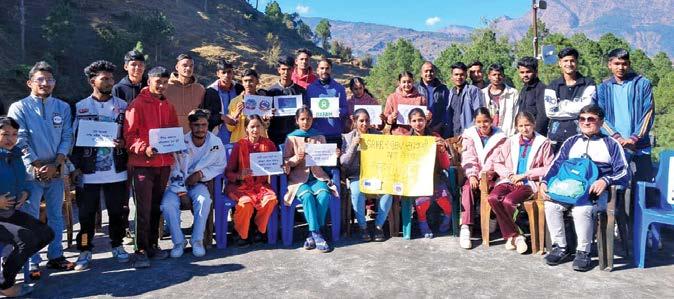
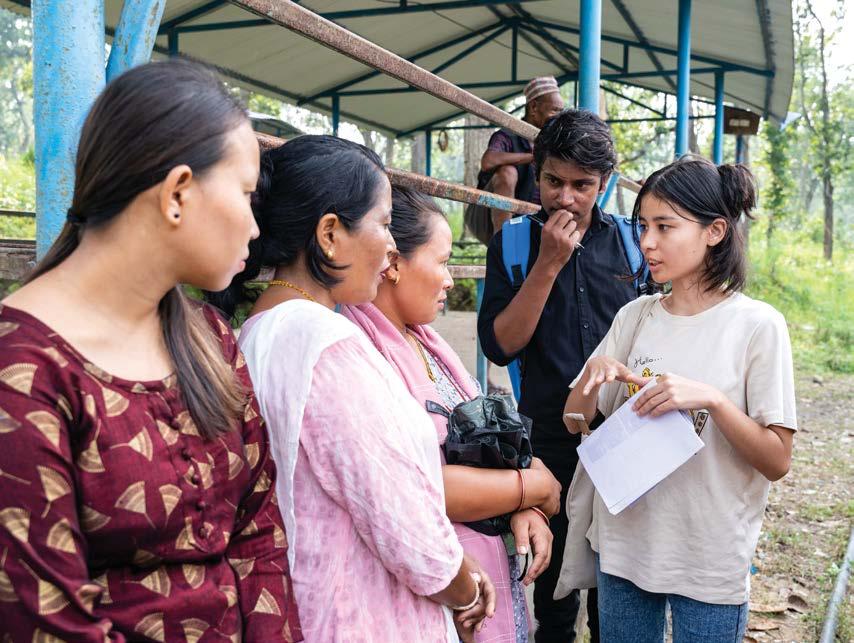

AAYUSHMA KAFLE Madhesh Province

DEVAKI RAWAL Karnali Province

KANCHAN KHATIWADA Sudurpashchim Province
Annex 1: YSB Members Second Cohort
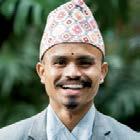
ABHISHEK BISTA
Sudurpashchim Province

DIKSHYA BHARATI Karnali Province

MAMATA B.K. Sudurpashchim Province

ALISHA DAHAL Sudurpashchim Province

DIMPI LAMA Madhesh Province

MAN SINGH BIST Sudurpashchim Province

ANKIT CHAUDHARY Madhesh Province

JYOTI MANDAL Madhesh Province

MOHAN BUDHA Karnali Province

BAM BAHADUR B.K. Sudurpashchim Province

KAIYUM RAIN Madhesh Province

NANDANI SAH Madhesh Province





Province

RAKSHYA AWASTHI Sudurpashchim Province
NYIMA DHONDUP GURUNG Karnali Province

ROSHAN OJHA Sudurpashchim Province
PRADIP
Karnali Province

SANGAM SHAH Madhesh Province
Karnali Province
Sudurpashchim Province
Madhesh Province
PUJA
SHRESTHA Madhesh Province


Sudurpashchim Province

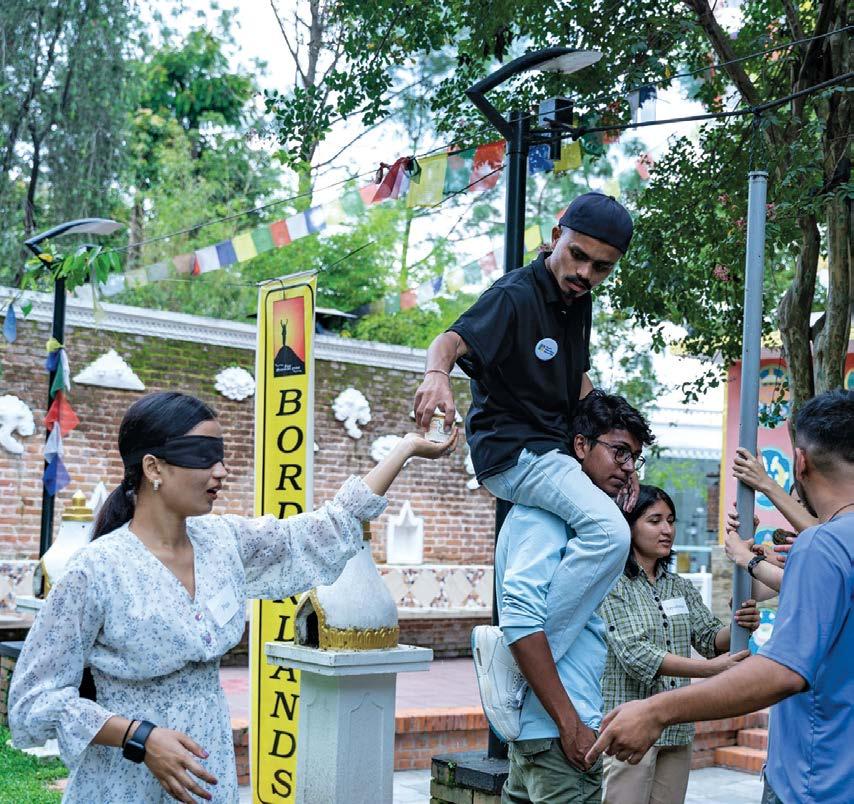
MAKING OUR VOICES HEARD
Neelsaraswoti marg 667 | Kathmandu | Nepal © European Union, 2024
The contents of this publication do not necessarily reflect the position or opinion of the European Commission.
